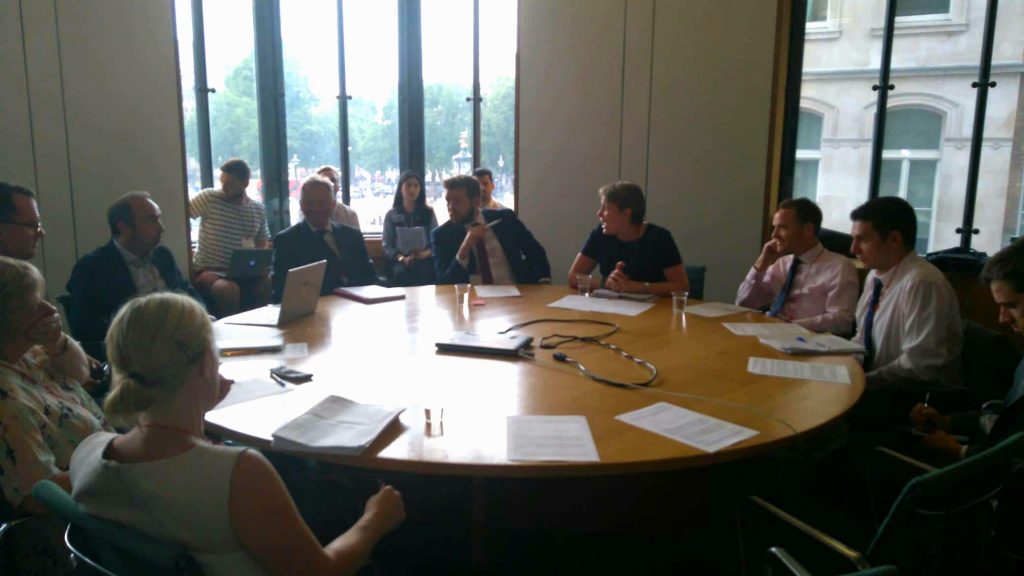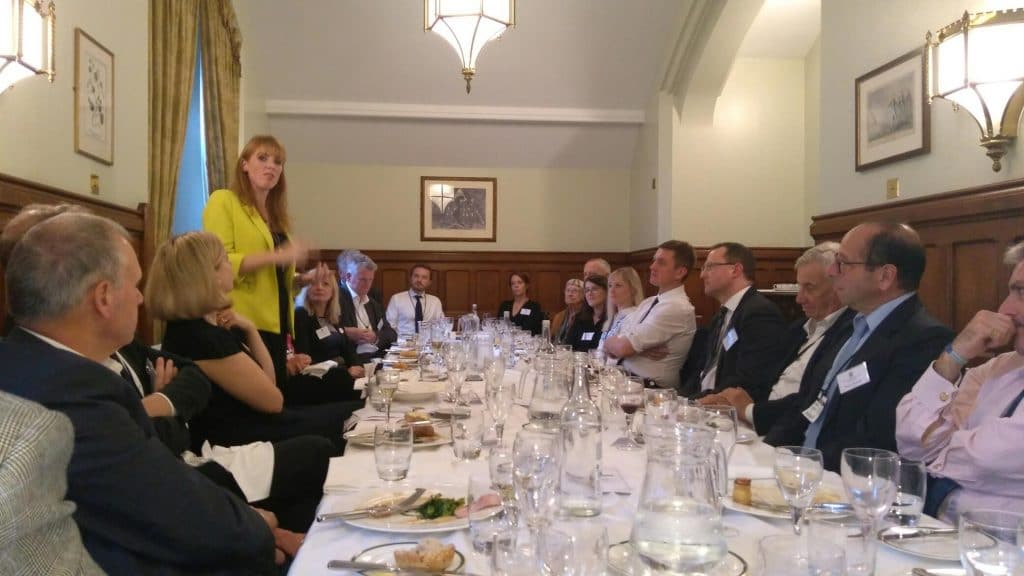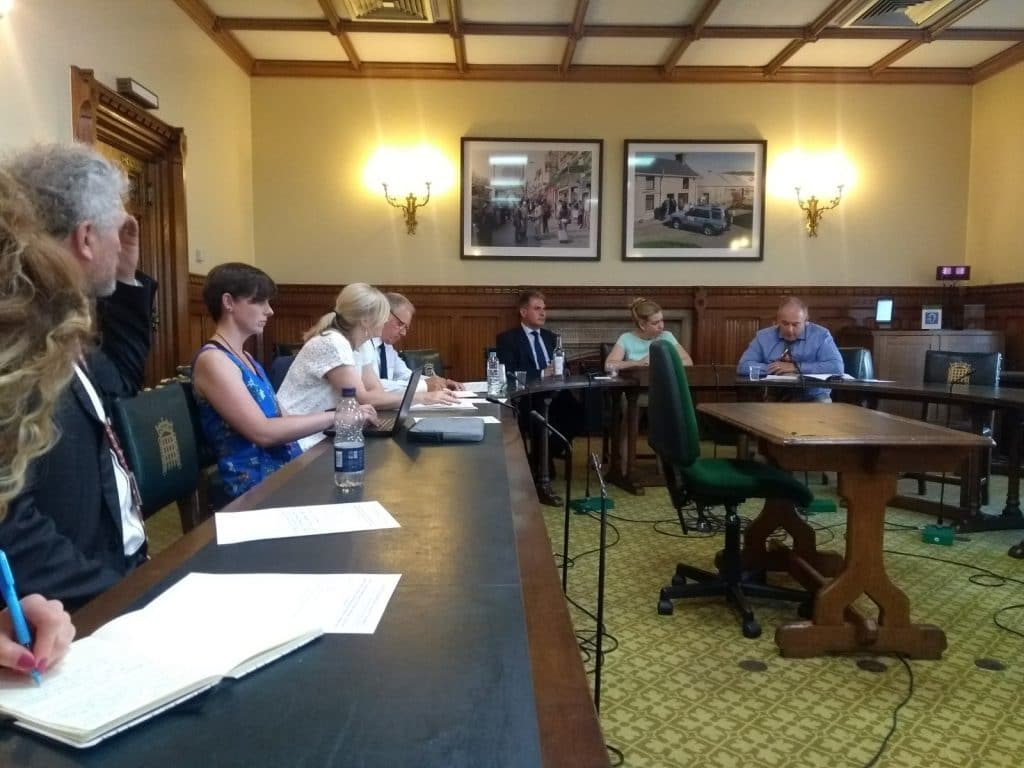Caroline Wright, Director General of BESA, introduced the APPG for Education and explained that she would be chairing in the discussion in the absence of Andrea Jenkyns MP.
Caroline introduced BESA and talked about the potential for EdTech to be a force for good in the classroom. She also ran through some barriers to the use of EdTech in schools, including an anti-tech rhetoric over recent years. However, she said that while barriers still exist, it feels like we are reaching a turning point: the government is interested and a generation of teachers exist that are keen to use tech.
Caroline then introduced the panel and invited Tom Thacker, Head of Curriculum at CENTURY Tech, to speak first.
Tom said that he was a former Teach First maths teacher and had been a fan of EdTech in the classroom. He left teaching partly due to workload and partly due to his interest in technology to work for CENTURY Tech, an EdTech company that uses AI to improve pupil outcomes and cut teacher workload. Citing Reform’s recent report, Beyond Gadgets: EdTech to help close the opportunity gap, he said that one of the most exciting things about EdTech is its potential to narrow the attainment gap.
He warned that proving outcomes via EdTech is hard: studies are hard to find; random controlled trials are difficult or impossible in a school context due expense, duration and ethics; and EdTech can evolve and improve over the course of a study, making early results misleading and the resultant studies age quickly. He also said that EdTech is hard to clearly define in a study context due to its wide range of use.
Dominic Norrish, Group Director of Technology at United Learning, spoke next. He said that there has been 30 years of hype around EdTech and said that one of the barriers to its uptake is its implicit critique of teaching. He said that teachers do not see EdTech as ‘core’ to their practice in comparison to other methods. He agreed with Tom that measuring the impact of EdTech is hard, or can be accurate but misleading as in the case of meta-analyses which include tech from the 1960s in their scope. However, despite the difficulty of proving the impact of tech, he said that teachers’ lived experience is that EdTech is useful.
Dominic said that there is an unhelpfully dichotomous debate surrounding EdTech, characterising as either ‘good’ or ‘bad’ when the reality is that EdTech magnified the impact of teaching already in place. He said that he had worked with over 100 schools and only 5 where EdTech was having a discernible difference, which was driven by strong leadership and rigorous implementation.
Daniel El-Gamry, author of Beyond Gadgets: EdTech to help close the opportunity gap, spoke next. Drawing on his personal experience of education through a state school in Tottenham, he said that many people underestimate the ability of tech to transform children’s lives. He said that one of the main advantages of EdTech was that it could free up time for teachers to make the interventions they want.
Daniel posed the question: who should be measuring the impact of EdTech in schools? He said that schools know what works best and should be encouraged to embrace the innovation and disruption. Due to the proliferation of academies, schools have more autonomy now than ever before, creating an ideal environment for innovation.
Daniel said he was encouraged by the role of teachers in designing EdTech, especially software. He said it is important to look at how best practice is shared at regional level, highlighting the role that multi-academy trusts can play. He talked about the role of Ofsted, saying that the new inspection framework is due soon and could benefit EdTech should the inspectorate assess digital skills alongside literacy and numeracy.

Caroline Wright asked the panel about resistance to EdTech from teachers. She asked whether the industry or government should be trying to convince them of the role of tech and, if so, what could be done to persuade reluctant teachers.
Tom Thacker said that he agreed that efforts should be made to win over teachers. He said that there is a need for high-quality CPD, saying that CENTURY requires the completion of CPD to use its product. He warned that, while digital skills for children are regularly discussed, not enough consideration is given to teachers’ digital skills. These need to be addressed for teachers to get the best out of EdTech.
Dominic Norrish said that it is not just about teachers wanting to use EdTech; there is too much else going on. He also said that head teachers in charge of schools need to understand the benefits of EdTech. Daniel El-Gamry added that technology is not fully integrated into what schools offer; it should be implemented across the curriculum.
Rachel Matthews from Instructure said that, from her experience of working across schools to implement EdTech, she agreed that leadership was important. She said that EdTech comes second to considerations of how much resource is available and areas of the curriculum prioritised through accountability. She said that schools are crying out for direction. There may be a role for Ofsted in providing this direction. Digital strategies and frameworks could also be effective, citing the digital procurement model of schools in the Nordic countries.
Patrick Hayes from BESA spoke about BESA’s most recent Efficacy in EdTech: What’s the evidence report. It found that, from the teacher’s perspective, barriers to the use of EdTech were not just about low budgets, but – more significantly – about the willingness to use technology or their understanding of the benefits. He said that two solutions that are often suggested are additional training or the involvement of Ofsted. He asked the panel if these solutions would work.
Dominic said that targeted training is important, adding that schools should be required to engage in EdTech. He said that schools need to know the benefit. In order to encourage schools to use EdTech, Dominic said that there needs to be a straight line between what schools are measured on and what EdTech can deliver.
Ysanne Heald from TEEM Education gave an example of headteachers being given laptops, which helped them to be engaged in tech and to see the benefit. She said that an additional barrier facing EdTech is the new computing curriculum, which has in too many cases seen all of a school’s tech resources consolidated in that one area.
Caroline Wright asked who helps or challenges head teachers at schools. She asked whether there was a role for governing bodies.
Tom Thacker said that it is difficult to expect much from certain governors; they are too diverse a group and it is difficult and unrealistic to find people with the right skills in every case. Dominic supported Tom’s views, saying that governance is not the right answer though it might be more possible in MATs.
Jonathan Parts from Afzal Khan MP’s office asked two questions. The first was about the best way to involve teachers in the design of EdTech, narrowing the gap between design and practice. The second was about the role of teachers alongside EdTech enabled self-directed learning.
Dominic Norrish said that there is a role for self-paced learning alongside the current system. He cited Hegarty Maths as an example used by United Learning Schools which sits alongside the traditional model of teacher directed learning. He pointed out that the system was designed by maths teachers as well. Rachel Matthews added that self-paced learning can be more applicable in later school years. Ysanne Heald said that it is often the most disadvantaged pupils who gain the most from personal motivation and the least from self-guided learning. Dominic Norrish responded that effective self-paced learning needs to have accountability measures built in to ensure that children are doing the work, and therefore reaching disadvantaged children who might not otherwise participate.
Citing the example of Scotland who have created an approved procurement list for school technology, Caroline Wright asked whether procurement frameworks were appropriate. She warned that, in Scotland, the approved lists meant that schools were finding it difficult to SEN products that were not on the lists.
Dominic said that recommendations without a closed shop would be helpful, particularly if the recommendations were user-generated rather than dictated from the top down. He said that it is concerning when governments get involved and that a light-touch approach is preferable. Daniel El-Gamry said that, during the days of BECTA, it was easier to procure but harder to get the right equipment. He said that any procurement system would have to be completely transparent.
Caroline finished by asking the panel what one thing they would recommend the DfE do to help EdTech in the classroom. Tom Thacker said the DfE should focus its efforts on providing good quality information to schools. He suggested that the DfE investigate ways of sharing best practice, perhaps in a similar vein to WonderHub. Dominic Norrish suggested a small, acceptable lever in Ofsted’s framework to get schools to engage more in EdTech, specifically that a statement be included in the Effectiveness of Leadership and Management judgement along the lines of ‘The school’s leadership has made discerning use of technology to address challenges/ improve efficiency/ strengthen teaching and learning’. Daniel El-Gamry said that a speech would be useful as it would demonstrate political will. He added that the DfE needs to look at the available infrastructure, particularly for rural and coastal schools, which can act as a major barrier to adopting EdTech.
Caroline brought the meeting to a close and thanked the panellists.



